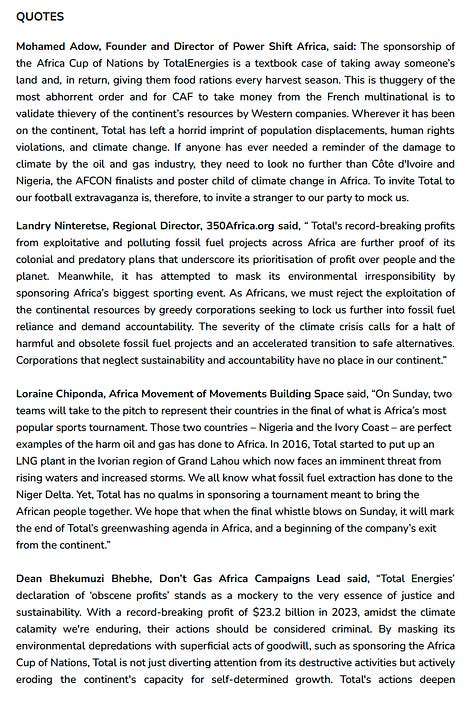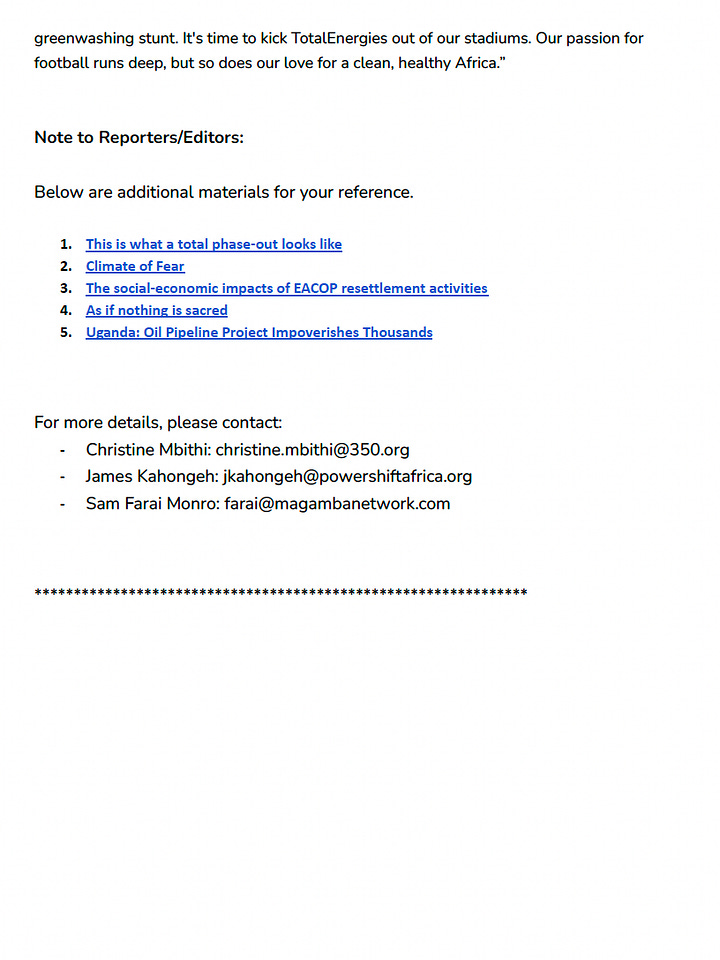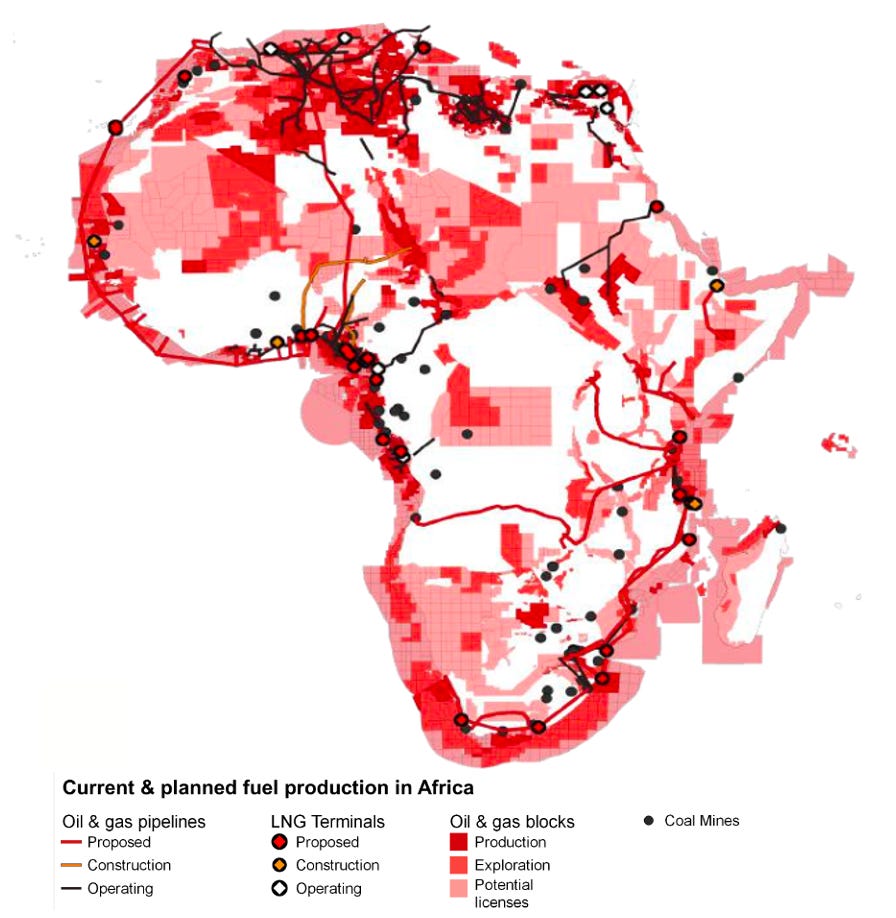Salamno from Addis Ababa, Ethiopia!
African football fans enjoyed some amazing football matches over the last few weeks. We celebrated our football superstars and our favorite teams during the 2023 African Cup of Nations (AFCON). However, a tournament that was moved to 2024 because of the climate-induced unfavorable and sometimes disastrous weather conditions that affect West Africa during the tropical rain season. And to add insult to injury, our AFCON has been hijacked by TotalEnergies as a platform to sportswash and greenwash its extraction, pollution, and abuse of the African continent. Decolonizing African football is just as important as decolonizing our economy, education, and just about every aspect of our lives. Ultimately, of course, we are talking about Decolonizing the Mind.
African CSOs call out TotalEnergies
Thanks to the excellent work of African Civil Society Organizations, the hijacking of AFCON by TotalEnergies to greenwash its abuse of the African continent did not go unchecked. Please read the full press release that I included below, but let me highlight a couple of statements from a couple of African Civil Society leaders.
The sponsorship of the Africa Cup of Nations by TotalEnergies is a textbook case of taking away someone’s land and, in return, giving them food rations every harvest season. This is thuggery of the most abhorrent order and for CAF to take money from the French multinational is to validate thievery of the continent’s resources by Western companies. Wherever it has been on the continent, Total has left a horrid imprint of population displacements, human rights violations, and climate change. If anyone has ever needed a reminder of the damage to climate by the oil and gas industry, they need to look no further than Côte d'Ivoire and Nigeria, the AFCON finalists and poster child of climate change in Africa. To invite Total to our football extravaganza is, therefore, to invite a stranger to our party to mock us. ~ Mohamed Adow, Founder and Director of Power Shift Africa.
Fossil fuels - the lifeblood of climate-wrecking companies like TotalEnergies - are poisoning the lungs of African athletes and soccer fans. But Total continues to displace communities for new oil drilling and spew toxins before shipping massive profits back to Europe. And yet they have been allowed to be title sponsors of AFCON. This is unacceptable. Total is turning AFCON from a celebration of African unity into a grotesque greenwashing stunt. It's time to kick TotalEnergies out of our stadiums. Our passion for football runs deep, but so does our love for a clean, healthy Africa. ~ Cynthia Moyo, Greenpeace Africa's Climate and Energy Campaigner.





Total Economic Entrapment Exposed
It is not by accident that Africa's top oil exporters import most of their fuel from international suppliers in the global north, it is by design. Oil companies in the global north control the technologies for prospecting, drilling, and refining fossil fuels. They use a classic play book of economic entrapment to make oil rich countries energy poor, technologically dependent, and at their mercy to power our economies.
Step 1: Country X gives prospection permits to an oil giant like TotalEnergies because they are told they have the right to use their sovereignty to exploit their natural resources; they are told African countries have “the right to development.”
Step 2: TotalEnergies finds massive oil reserves, and offers to drill and extract said oil reserves to export to international markets. Country X often gets only a small ownership share (maybe 15-30%) in its own oil projects. And because country X has no way of fully controlling how much TotalEnergies is actually exporting, pure theft of crude oil is often not a far fetched possibility.
Step 3: Country X asks TotalEnergies to help it build a refinery to cover all of its domestic needs and to give the country full energy independence. TotalEnergies will say, no way, your economy is too small, refineries are too expensive to build, you’re better off importing refined oil products from international markets…. Maybe in a few years we’ll consider it, but only if you can pay $3.5 billion. Oh, and by the way, we still need you to contribute to the oil extraction upfront cost. Build an airport in the middle of nowhere so we can bring our equipment (in other words, start borrowing a few hundred million dollars now). Figure out a way to clear the path for a pipeline. Help us keep displaced communities and environmental activists out of the way.
Step 4: Country X has no plan B. Its people already know there is a lot of oil money coming, so their expectations are already high, and a long list of development projects and demand for public services is putting pressure on the government to deliver results.
Step 5: The government already walked into a debt trap to cover upfront costs. Oil revenues start to flow, the government gets into debt-financed investments in infrastructure, schools, hospitals, roads, bridges, sanitation, housing… all of which often serving upper class interests and prioritizes more extractive economic activities.
Step 6: Because of the boost in economic activity, Country X starts importing even more fuel to power its grid, the new cars and trucks that people have imported, and to satisfy the higher level of energy demand.
Step 7: Consumers in Country X demand even higher standard of living and start importing even more clothing and gadgets from international brands. The country’s trade deficit is even wider than before the oil discovery.
Step 8: Country X wants to industrialize, but the only “industrialization” it is allowed to have is bottom of the global value chain manufacturing: import machines, import intermediate components to assemble with low cost labor, import the fuel to power the factories, and even import the packaging.
Oil Giants have Strategic Plans for Africa
Africa's "friends" (see list above) are meeting in London May 14-16, 2024 to plan the best ways to exploit the continent and to keep it energy poor and indebted, essentially using the the same Total Economic Entrapment playbook outlined above. And of course, if African political leadership doesn’t put forward and activate a strategic and comprehensive energy policy that interlocks with the Africa Mining Vision and a Pan-African industrial policy, we will continue to be part of somebody else’s strategic vision.
Take a look at the current and planned fossil fuel production plans in Africa. The map below, which we feature in the Just Transition report (available in English & French) that we publish last May (published by The Independent Group of Experts on Just Transition & Development), looks more like an military invasion plan, or an old map from colonial extraction plans. The reality is that this is not an energy security plan.
Africa’s Actual Right to Development
Imagine if 100 years ago when the world was transitioning to the automobile as the main mode of transportation, someone decided we are a sovereign nation, we have the right to development, and we’re going to use our resources to double down on investing in the horse and cart industry, and we’ll let the rest of the world invest in new technologies that will dominate the next century. That is exactly what the fossil fuel industry means with the “right to development” narrative.
It is precisely because Africa has the right to an alternative development path that we should not accept getting locked into the obsolete, expensive, dangerous, unhealthy, inefficient, exclusive, and abusive energy system of the past. Instead, Africa’s biggest opportunity is to leapfrog into a the energy system of the future by taping into its enormous renewable energy potential. According to the International Renewable Energy Agency (IRENA), “Africa’s estimated potential to generate renewable energy from existing technologies is 1,000 times larger than its projected demand for electricity in 2040.”
Finally, Africa cannot walk into a new debt trap as it leapfrogs into a renewable energy future. Africa cannot be the exporter of cheap critical minerals, the importer of renewable energy technology, and the continent locked at the bottom of the global value chain. Africa’s renewable energy potential, is a platform for industrializing the continent and truly decolonizing its economic system. Africa has all the natural resources (strategic minerals) needed for a high-tech revolution, it has the economies of scale needed for industrialization, and has the market demand to support manufacturing of clean energy, clean cooking, and clean transportation infrastructure that will create millions of jobs, and truly provide the transformative development pathway that has been systematically denied to us.
While Africa does have the complementarity of recourse and capabilities at scale, it does still lack access to the technological manufacturing capabilities for this type of Pan-African industrial policy. Which global economic powerhouse will be willing to transfer technology for this life-saving transformative climate and development strategy? Is it going to be the US, Japan, Germany, UK, France, or China? I will come back to the geopolitical dimension of this question in a separate piece soon. Are we able to address one of the major blindspots about industrialization, which is the international trade and investment architecture that is dominated by the WTO (especially the TRIPS rules)? And why are we speaking of Pan-African industrial policies? why not focus on national industrial policies? Again, I will write about this soon, but I wanted you to think about these key questions, the answers to which will make or break our efforts to decolonize Africa.
Decolonizing African football and taking back AFCON from TotalEnergies is part and parcel of an all-encompassing vision to restore African economic and monetary sovereignty. We must double our efforts to do the radical work needed to activate Agenda 2063: The Africa We Want, starting right here this week in Addis Ababa as we gather here to witness the 2024 African Union Summit (which I write about in a few days).
Ameseginalehu 🙏🏽
Fadhel Kaboub is an associate professor of economics at Denison University (on leave), and the president of the Global Institute for Sustainable Prosperity. He is also a member of the Independent Expert Group on Just Transition and Development, and serves as senior advisor with Power Shift Africa. He has recently served as Under-Secretary-General for Financing for Development at the Organisation of Southern Cooperation in Addis Ababa, Ethiopia. Dr. Kaboub is an expert on designing public policies to enhance monetary and economic sovereignty in the Global South, build resilience, and promote equitable and sustainable prosperity. His recent work focuses on Just Transition, Climate Finance, and transforming the global trade, finance, and investment architecture. His most recent co-authored publication is Just Transition: A Climate, Energy, and Development Vision for Africa (May 2023, published by the Independent Expert Group on Just Transition & Development). He has held a number of research affiliations with the Levy Economics Institute (NY), the John F. Kennedy School of Government at Harvard University (MA), the Economic Research Forum (Cairo), Power Shift Africa (Nairobi), and the Center for Strategic Studies on the Maghreb (Tunis). He is currently based in Nairobi, Kenya and is working on climate finance and development policies in Africa. You can follow him on Twitter @FadhelKaboub and you can read his Global South Perspectives on substack where he blogs regularly.










This is so revealing dear Prof. Thank you so much for sharing such an excellent insights...👏👏👏✅🟢
How can we instill this provoking realization of Africa independence to our leaders, they seem not to be reading from the same page with Pan Africanist like Kaboul, I still wonder why AU is hosted by China for instance